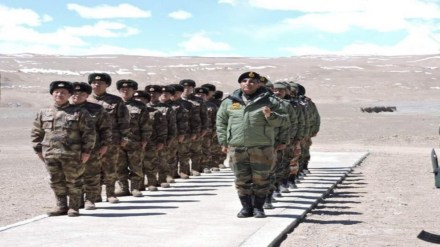The Indian Army resumed patrols in Demchok, eastern Ladakh, on Friday, following the recent disengagement of Indian and Chinese troops at key friction points in the region, according to Army sources. This development is part of an effort to restore stability along the Line of Actual Control (LAC), with patrolling in the Depsang area also expected to begin soon.
Indian and Chinese forces recently completed their disengagement at two significant points in eastern Ladakh: Demchok and the Depsang Plains. These areas have been sources of tension since the standoff that began in April 2020. The phased disengagement process concluded earlier this week, marking a positive step in Sino-Indian relations. After finalizing the disengagement on Wednesday, troops from both sides observed the Diwali holiday together on Thursday by exchanging sweets at several border locations, including Hot Springs, Karakoram Pass, and Daulat Beg Oldi, signalling a renewed effort to foster goodwill.
Sino-Indian Relations Thaw
This recent agreement on disengagement and resumption of patrols represents a milestone in de-escalating the border standoff, which has strained relations since the deadly clash in the Galwan Valley in June 2020. Indian Foreign Secretary Vikram Misri confirmed last week that the breakthrough was the result of several weeks of negotiations, highlighting the commitment of both nations to address outstanding issues diplomatically. The deal includes provisions for coordinated patrols by Indian and Chinese forces, which will allow each side to inform the other of patrol schedules to avoid further conflicts.
The disengagement is expected to restore pre-2020 patrolling norms, bringing back a sense of routine and order along the LAC. Ground commanders from both sides will work together to decide on the modalities of patrol schedules and protocols. Army officials say that additional talks will continue at the local commander level, with plans to ease restrictions along the border progressively.
Restore Stability at LAC
Commenting on the agreement, Ladakh MP Haji Hanifa welcomed the move, stating, “Those of us who live near the border know what war feels like. We desire peace along the border. We welcome the agreement between the two countries, but we want to see it implemented on the ground. Tensions along the border should be reduced through diplomatic means.” Chief of Army Staff General Upendra Dwivedi emphasised that restoring trust between India and China will be gradual, requiring steps like disengagement, de-escalation, and managing buffer zones to return to pre-2020 conditions.
Chinese Ambassador to India Xu Feihong also weighed in, acknowledging that while differences are natural between neighbouring countries, it is crucial to manage them constructively. The disengagement efforts signal a hopeful turn in Sino-Indian relations and may pave the way for further diplomatic progress along the LAC in eastern Ladakh, where tensions have persisted for over four years.
(With agency inputs)
